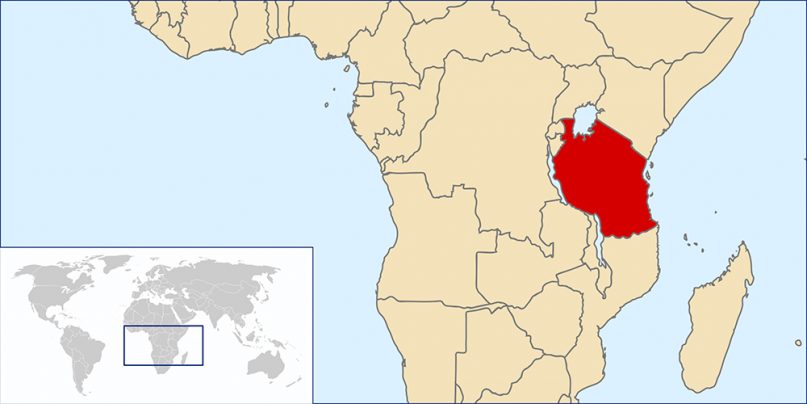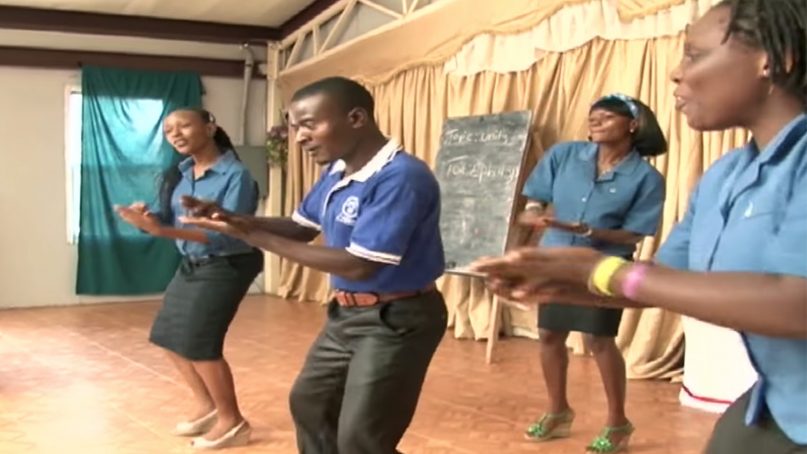
A preacher delivers the sermon with sign language during a service at Immanuel Church for the Deaf in Dar es Salaam. Video screenshot
BAGAMOYO, Tanzania — On a recent Sunday morning, Isaac Mbaga met with two friends to worship in his house in this town on the east side of the country’s major port city, Dar es Salaam.
As they began their worship service with songs, the three — all of whom are deaf — danced and signed along to the songs.
Soon, they sat and opened their Bibles and read from the Gospel of Matthew: “Come to me, all you who are weary and burdened, and I will give you rest.”
Then, Mbaga asked his fellow worshippers in sign language about the meaning of the Scripture. They looked at each other and replied that they did not understand the scriptural message.
“This is the problem we have as deaf people,” said Mbaga, 33, with the help of a sign language interpreter. “We desire to know the Word of God, but we have nobody to help us. We have no pastors and churches around here for deaf people.”
Mbaga and his colleagues are among many deaf Tanzanians who have few options for worship. They say there is only one church nearby where deaf people can worship through sign language interpreters.
Many others across the country who cannot make their way to the church are left to read the Bible on their own to meet their spiritual needs.

Tanzania, in red, located in eastern Africa. Image courtesy of Creative Commons
“These deaf people are very frustrated because they can’t find anywhere to worship God,” said evangelist Mary Temba, who is also deaf. “We have very few churches in the country where deaf people can go and worship. We have only one church in Dar es Salaam, and you need to travel over 300 miles to find another church. In fact, we have only two active churches where deaf people can worship.”
Temba, who oversees several deaf churches in Tanzania and in other East African nations, said churches, mosques and other places of worship in the country are unwelcoming to people with hearing disabilities.
“They really don’t care if deaf people exist in their churches or mosques,” Temba said at her home in Bagamoyo. “These places of worship have no special services for people with hearing disabilities, therefore leaving them out from active worship. This is very unfair.”
Seleman Munisi, who is deaf, has attended the Africa Independent Pentecostal Church at Bago village in Bagamoyo.
Throughout praise and worship time, Munisi danced with other worshippers and often tapped the edge of a folded fist to an open palm to indicate “Amen.”
When the pastor took to the podium to bring the message of the day, Munisi sat attentively but struggled to follow the preaching and prayers.
“I enjoyed the praise and worship service, but I didn’t hear the Word of God,” said Munisi, who is 25. “I love Jesus but I have nowhere I can go and worship. It’s the reason I come here and worship with others. I have no fare to travel to Dar es Salaam and worship with my colleagues with the help of a sign language interpreter.”
The National Bureau of Statistics Disability Survey Report of 2008 showed deafness is Tanzania’s third-most-prevalent form of disability. The number of deaf people was 607,618 in 2008 when the population of the country at the time was 42 million. The population currently stands at 56 million.

The praise team performs at Immanuel Church for the Deaf in Dar es Salaam. Video screenshot
At the Immanuel Church for the Deaf in Dar es Salaam, hundreds of deaf worshippers filled the sanctuary while others stood outside, trying to catch a glimpse through the windows during a recent church service.
The church for the deaf was founded with a group of pastors from Kenya and Uganda when they realized that there was a dire need in Tanzania. The church now has more than 700 congregants.
“We have a problem here but we are going to open more branches. We have realized that the use of sign language has helped deaf people to accept Christ and even live better lives. They are confident and they now feel loved,” said Joseph Hiza, the church’s general secretary.
Church member Agnes Salome agreed. “I’m very happy nowadays because I can worship God,” Salome said through a sign language interpreter. “I can comfortably follow the preaching by the evangelist. The worship service is great and we sing in sign language.”
Others deaf Tanzanians hope to have the same experience in the future.
“We want to worship God like other people because it’s our basic right,” said Mbaga. “I want to feel satisfied with God while I worship.”
